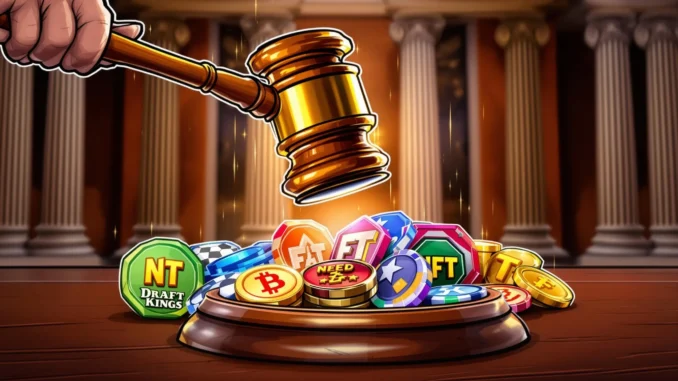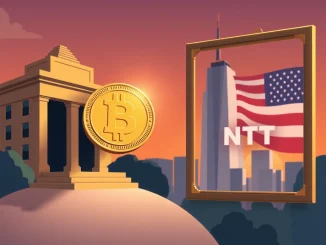
The world of NFTs, once hailed as the next big thing in digital ownership, is facing its share of legal scrutiny. In a landmark case that has the crypto community buzzing, sports betting giant DraftKings has agreed to a substantial NFT settlement of $10 million. This move comes in response to a class action lawsuit filed in 2023, accusing DraftKings of violating securities laws with their NFT offerings. Let’s dive into the details of this case and understand what it means for the future of NFTs and crypto regulation.
Why the NFT Lawsuit Against DraftKings?
The heart of the matter lies in the question: are NFTs securities? The plaintiffs in the NFT lawsuit argued that DraftKings’ sale of NFTs constituted the sale of unregistered securities. Here’s a breakdown of the key arguments:
- Securities Law Violation: The core claim was that DraftKings NFTs were investment contracts and therefore should have been registered as securities under both state and federal laws.
- Expectation of Profit: Plaintiffs contended that buyers purchased DraftKings NFTs with the expectation of profit derived from the efforts of DraftKings, a key characteristic of a security.
- Lack of Registration: DraftKings allegedly failed to register these NFTs with the Securities and Exchange Commission (SEC) or state regulatory bodies, which is a requirement for securities offerings.
Essentially, the lawsuit hinged on whether NFTs, in this specific context, functioned more like tradable investment assets rather than just digital collectibles. This is a crucial distinction that has broad implications for the entire NFT market.
DraftKings NFT Settlement: A $10 Million Resolution
To avoid a potentially lengthy and costly legal battle, DraftKings opted for a DraftKings NFT settlement. According to reports, the company will pay $10 million to resolve the class action lawsuit. While the exact terms of the settlement are yet to be fully disclosed, here’s what we know and what it likely entails:
| Aspect | Details of DraftKings NFT Settlement |
|---|---|
| Settlement Amount | $10 million |
| Beneficiaries | Class action members – NFT holders who purchased DraftKings NFTs during the specified period. |
| Admission of Guilt? | Settlements often do not involve an admission of guilt. DraftKings settling may be a strategic move to avoid further legal costs and uncertainty, rather than an admission of securities law violations. |
| Impact on DraftKings | Financial impact of $10M settlement; potential reputational impact; possible changes in future NFT offerings. |
| Impact on NFT Market | Sets a precedent for future NFT projects; highlights regulatory risks; may lead to increased scrutiny of NFT offerings under securities laws. |
This NFT settlement is significant not just for DraftKings but for the entire NFT space. It underscores the growing legal complexities surrounding digital assets and the blurry lines between collectibles and securities.
Understanding Crypto Securities Law and NFTs
The DraftKings case throws a spotlight on the critical intersection of NFTs and crypto securities law. What exactly does this mean for NFT creators, platforms, and collectors?
What are Securities?
In simple terms, securities are financial instruments that represent ownership (stocks), debt (bonds), or the right to ownership (options). Securities laws are designed to protect investors by requiring transparency and registration for securities offerings. The definition of a security, however, can be quite broad and is often determined by the “Howey Test,” which originates from a US Supreme Court case.
The Howey Test and NFTs
The Howey Test is used to determine if something is an “investment contract” and therefore a security. It generally considers something an investment contract if it involves:
- An investment of money
- In a common enterprise
- With the expectation of profit
- To be derived from the efforts of others
Applying this test to NFTs is complex. While many NFTs are marketed as digital art or collectibles, some projects might inadvertently fall under securities regulations if they promise profits or are managed in a way that aligns with the Howey Test criteria. The DraftKings NFT lawsuit suggests that at least in some instances, NFTs can be viewed as securities, particularly if they are sold with an implied promise of increasing value or benefits derived from the issuer’s actions.
Implications of the Class Action Lawsuit for the NFT Space
The DraftKings class action lawsuit and subsequent settlement have several important implications for the NFT ecosystem:
- Increased Regulatory Scrutiny: Expect more attention from regulatory bodies like the SEC on NFT projects, especially those that offer utility or promise financial returns.
- Need for Legal Clarity: The industry desperately needs clearer guidelines on when NFTs are considered securities. This settlement might prompt regulators to provide more definitive frameworks.
- Due Diligence for NFT Projects: Creators and platforms will need to exercise greater caution and potentially seek legal counsel to ensure their NFT offerings comply with securities laws.
- Investor Awareness: NFT buyers should be aware of the potential risks and legal classifications of the NFTs they purchase. Not all NFTs are created equal, and some may carry regulatory baggage.
What’s Next for NFTs and Regulatory Compliance?
The DraftKings NFT settlement serves as a wake-up call for the NFT industry. It highlights the importance of navigating the evolving regulatory landscape. Moving forward, we can anticipate:
- More Legal Challenges: Similar lawsuits against other NFT projects could emerge, especially in projects that blur the lines between collectibles and investment vehicles.
- Industry Self-Regulation: NFT platforms and projects might proactively adopt best practices and standards to address regulatory concerns and build trust.
- Policy Developments: Governments and regulatory bodies worldwide will likely continue to grapple with how to regulate digital assets, including NFTs. We may see more specific regulations tailored to NFTs in the future.
Final Thoughts: Navigating the Evolving NFT Landscape
The DraftKings NFT settlement is a stunning reminder that the NFT space, while innovative and exciting, is not immune to legal and regulatory frameworks. As the industry matures, understanding and adhering to crypto securities law will be paramount. This case is a crucial step in the ongoing conversation about how to classify and regulate digital assets, ensuring a more sustainable and compliant future for NFTs. For creators, platforms, and collectors alike, staying informed and proactive in addressing these legal complexities is no longer optional—it’s essential.



